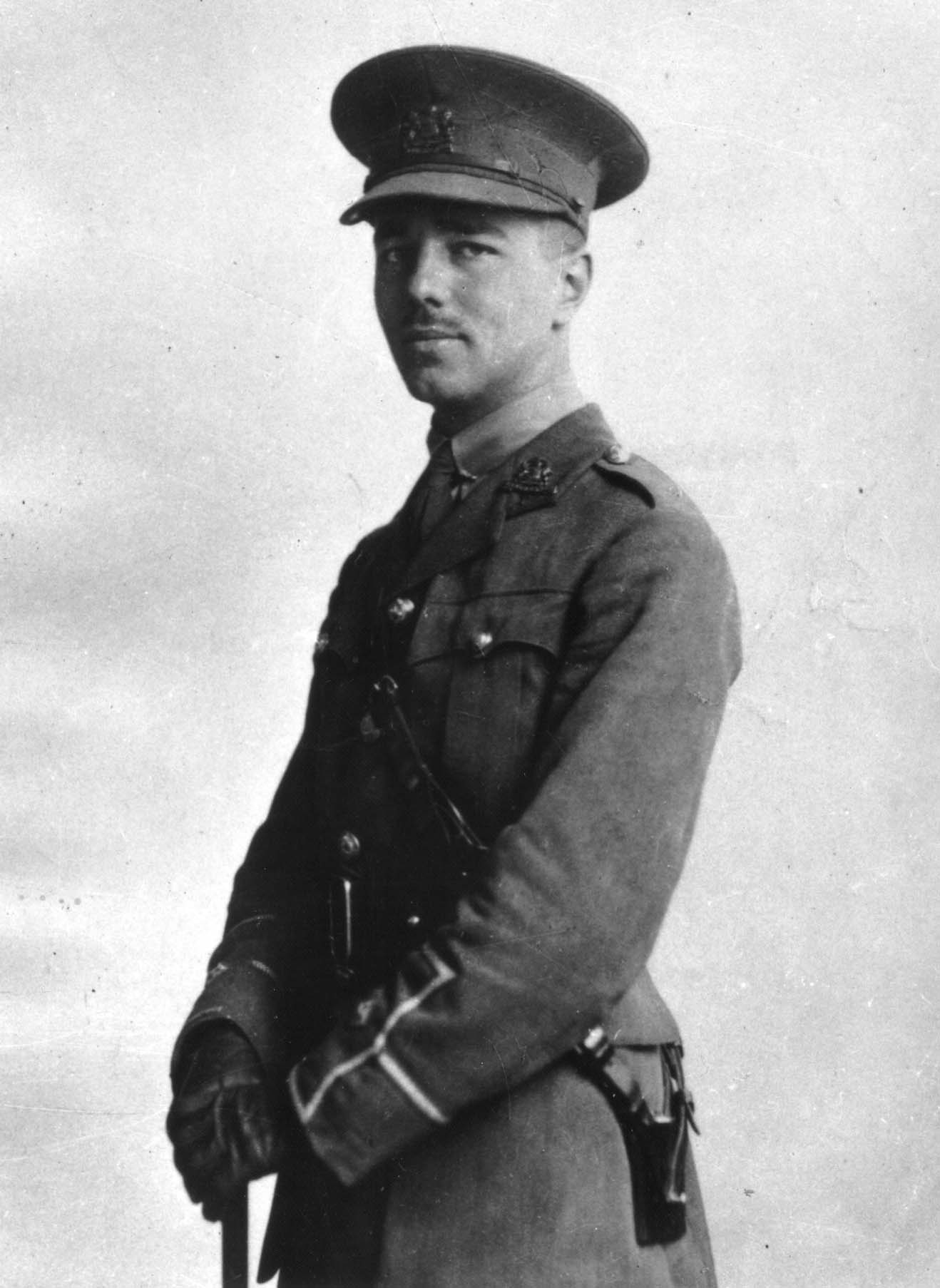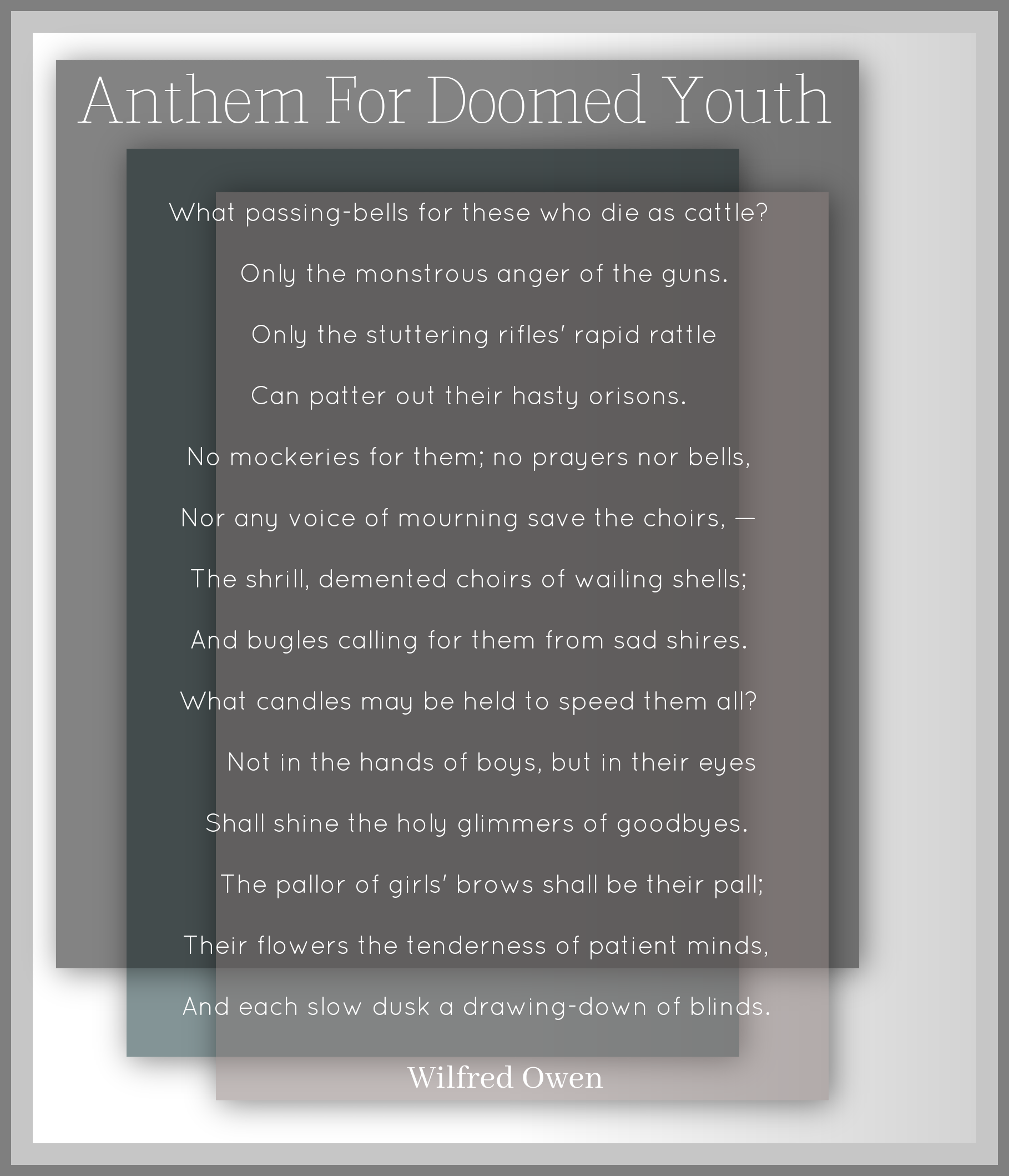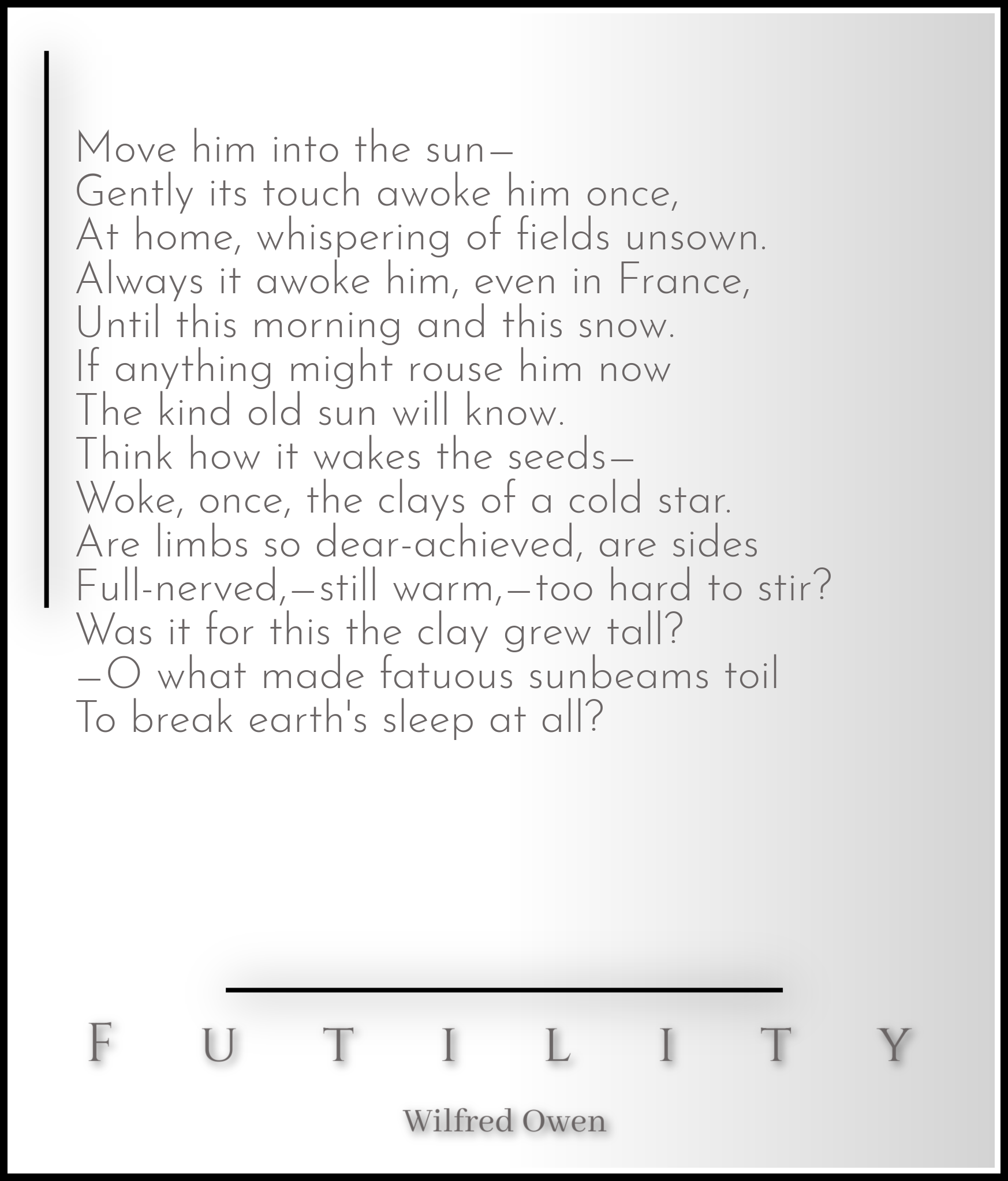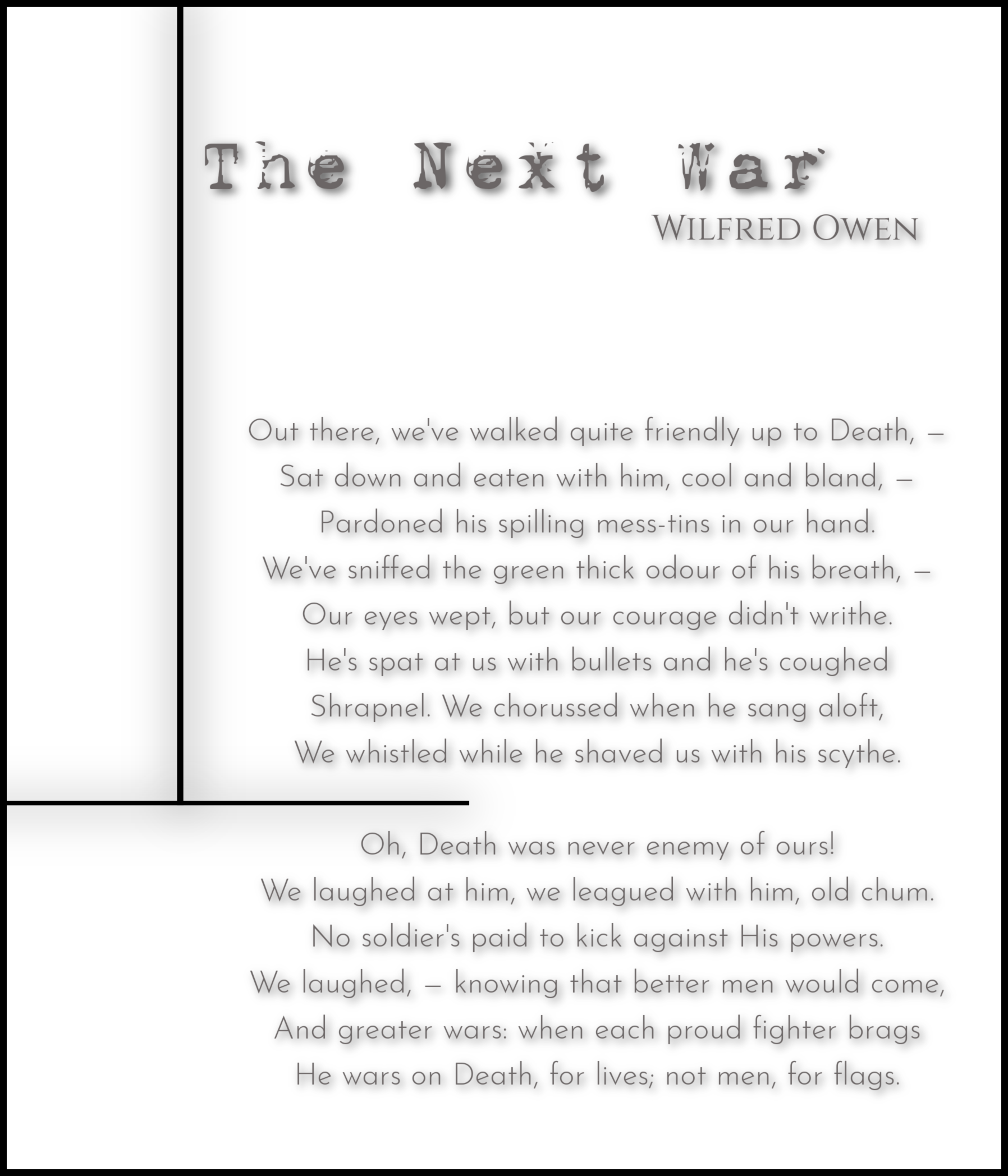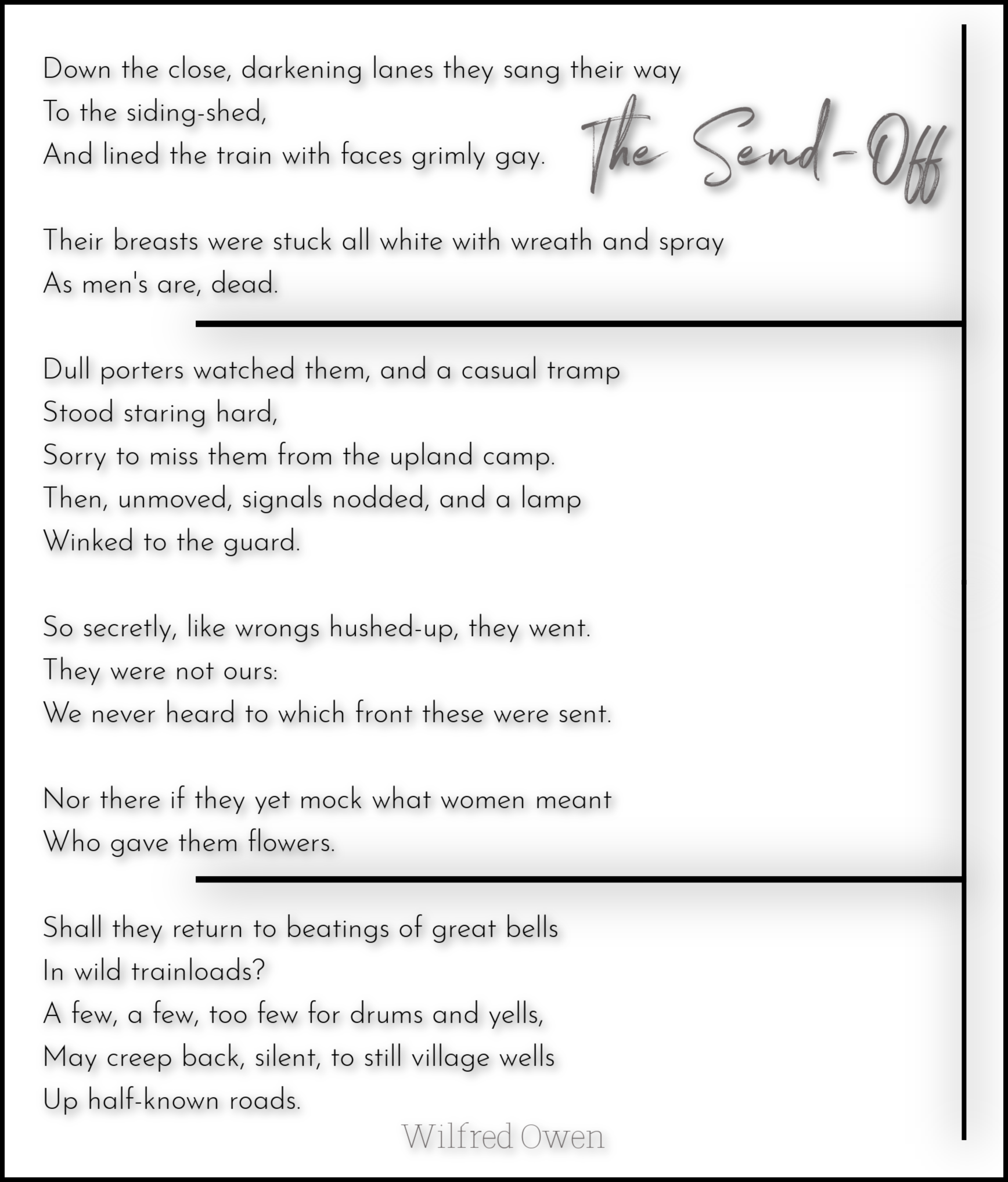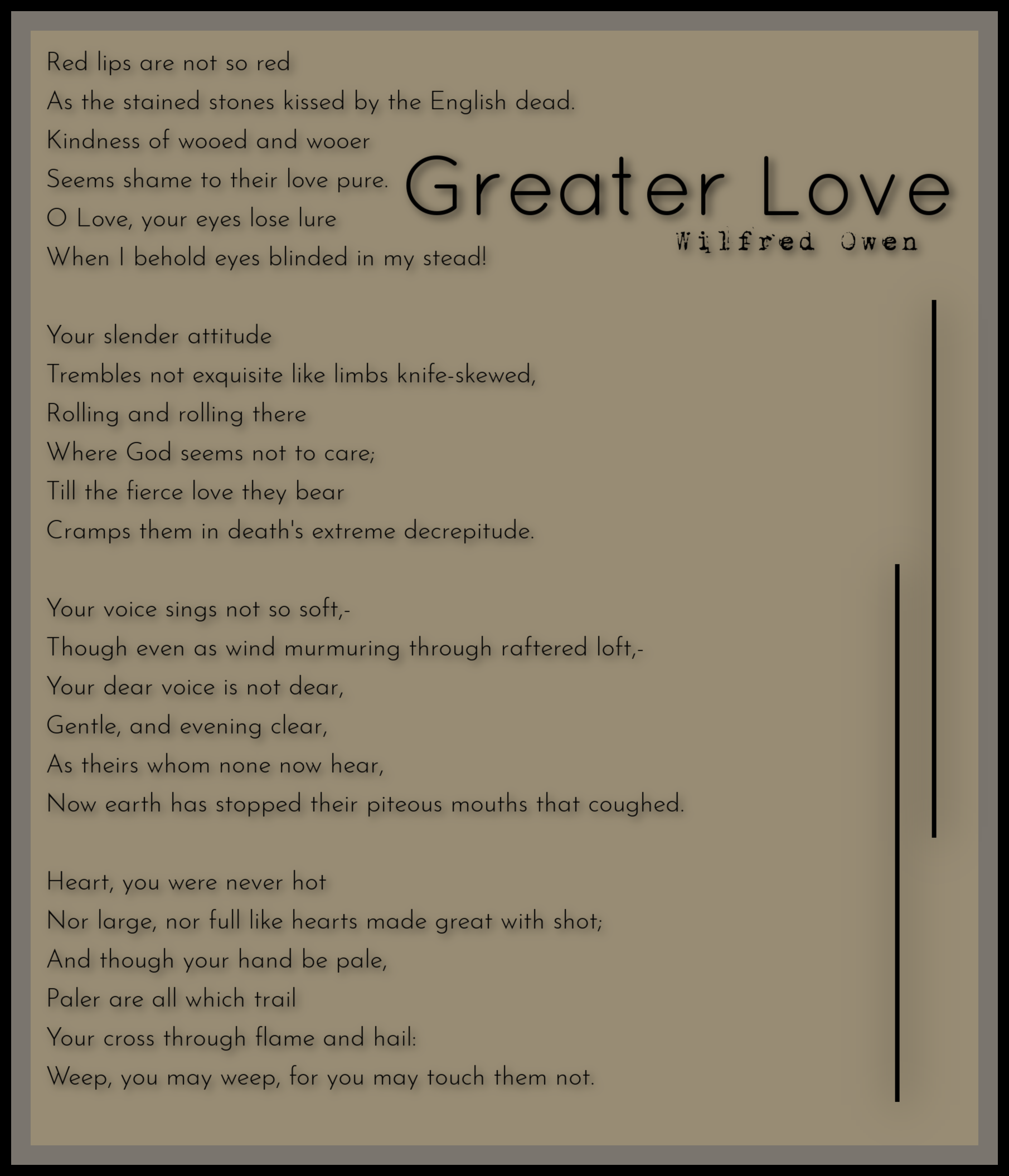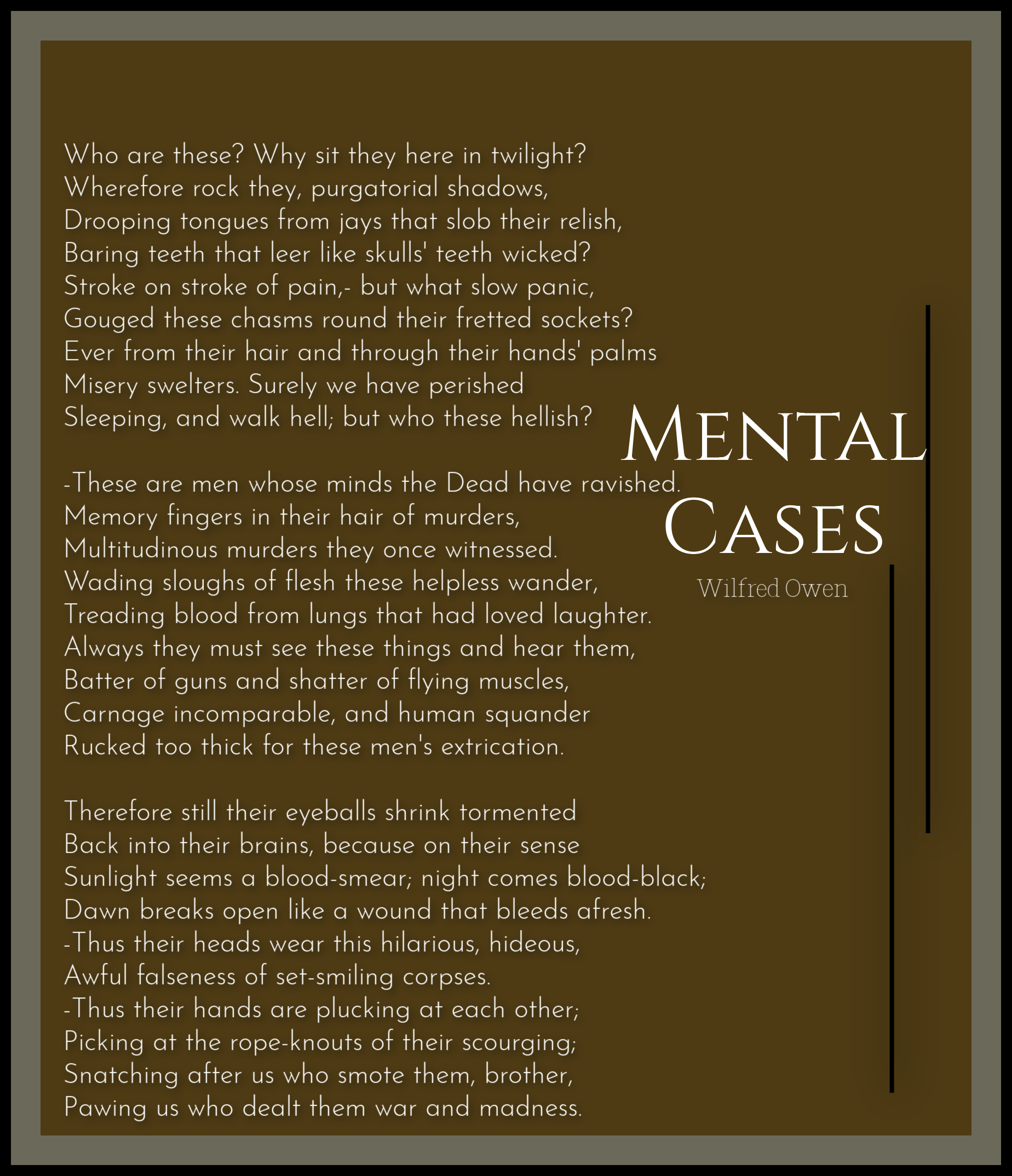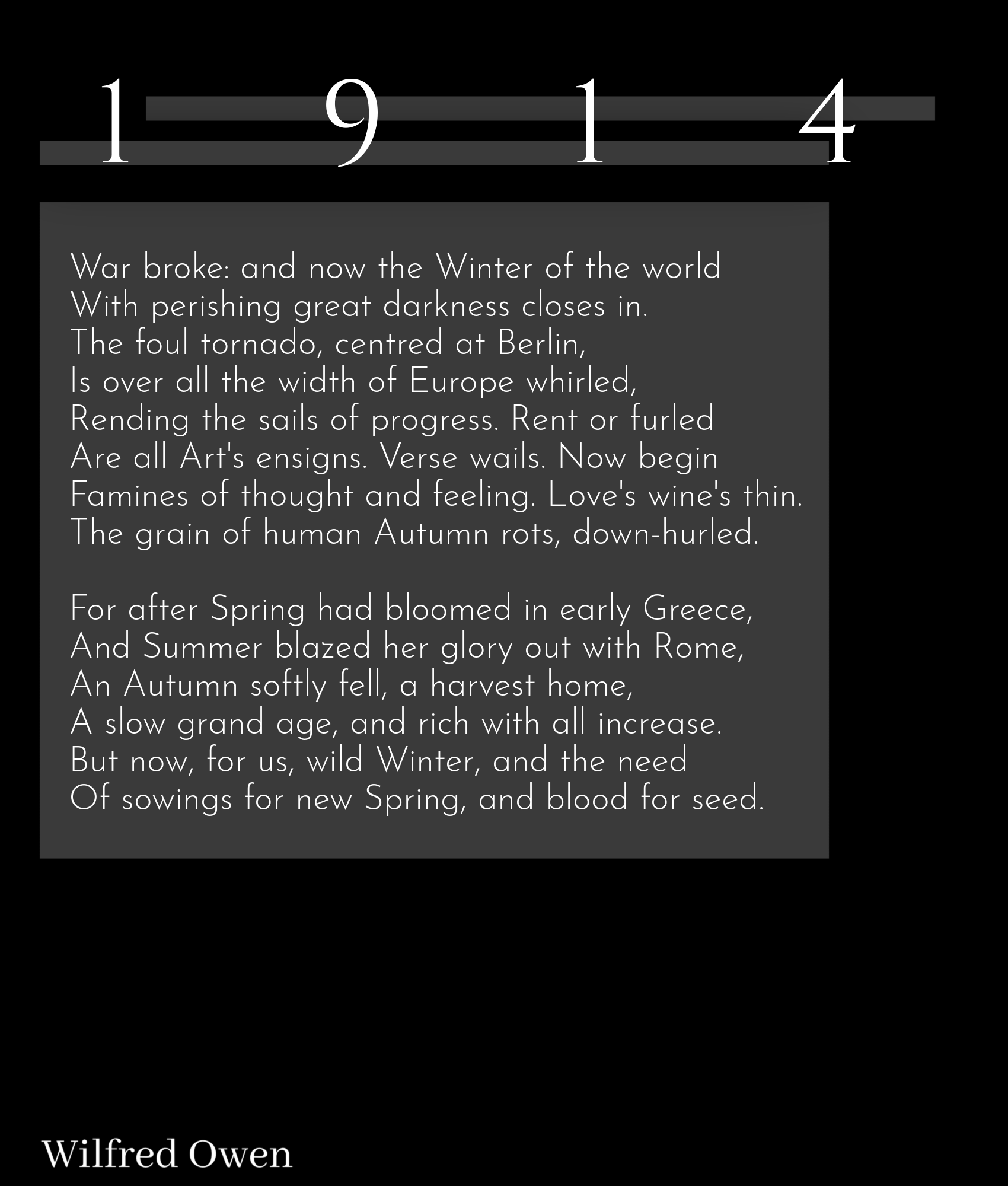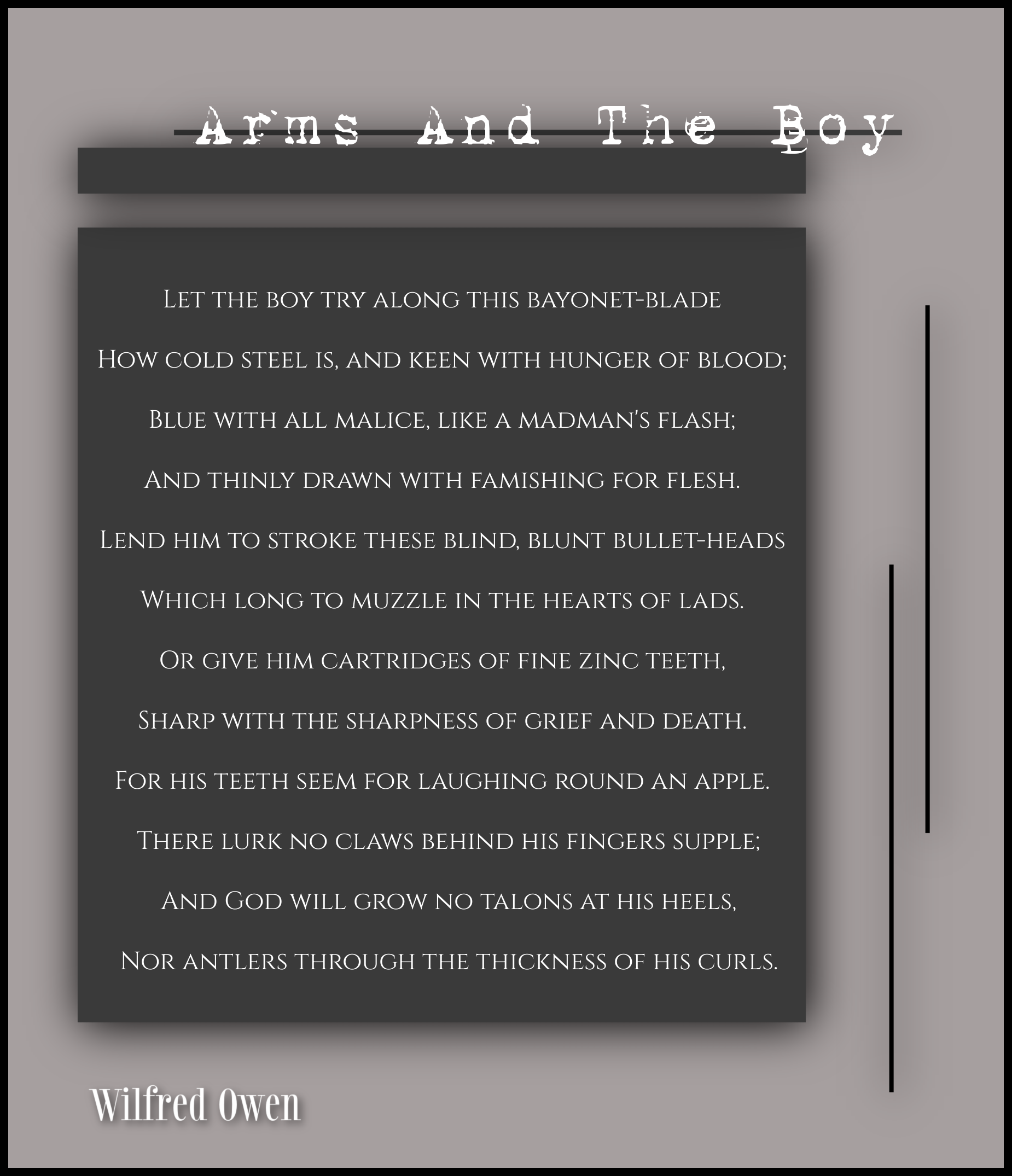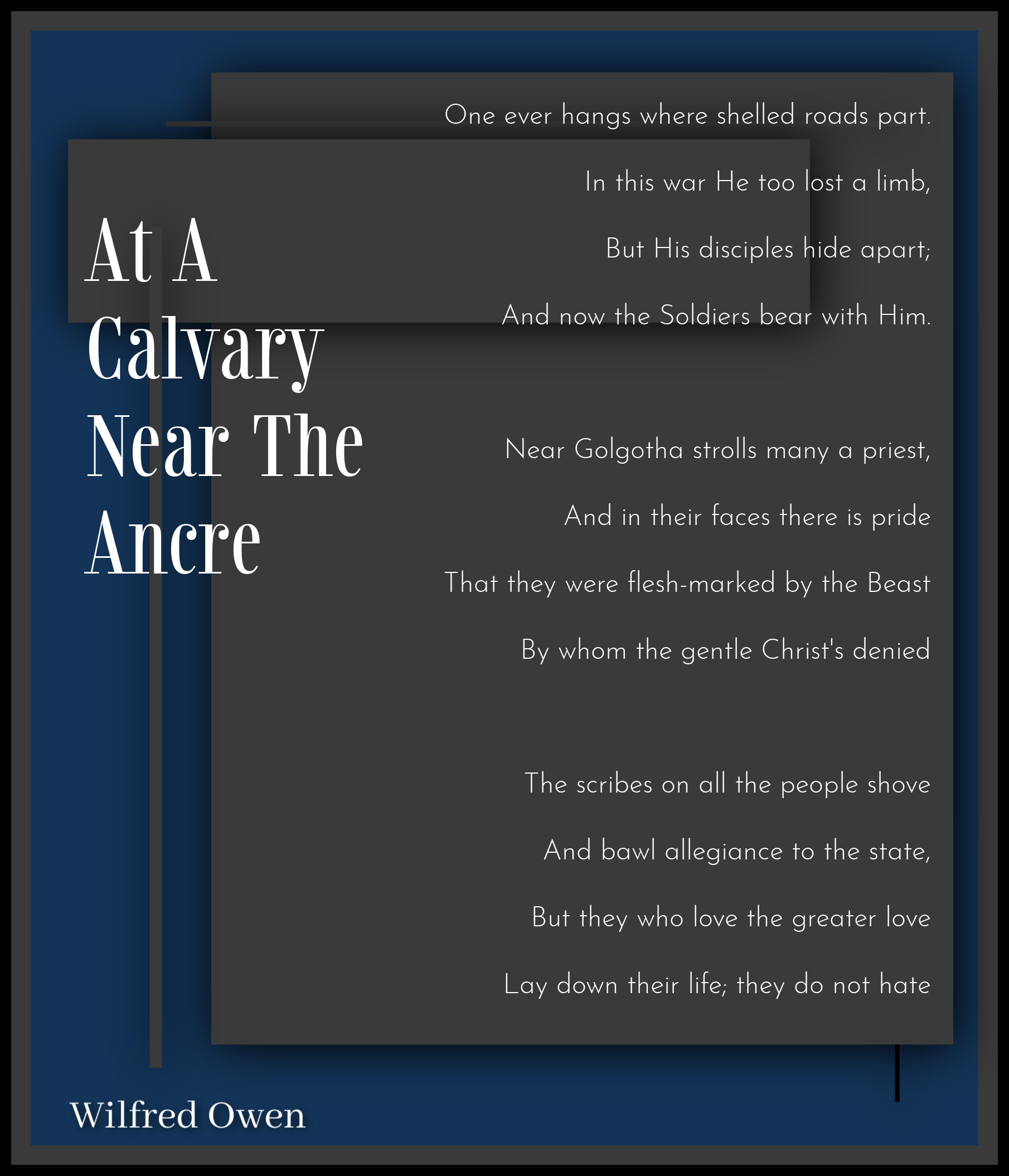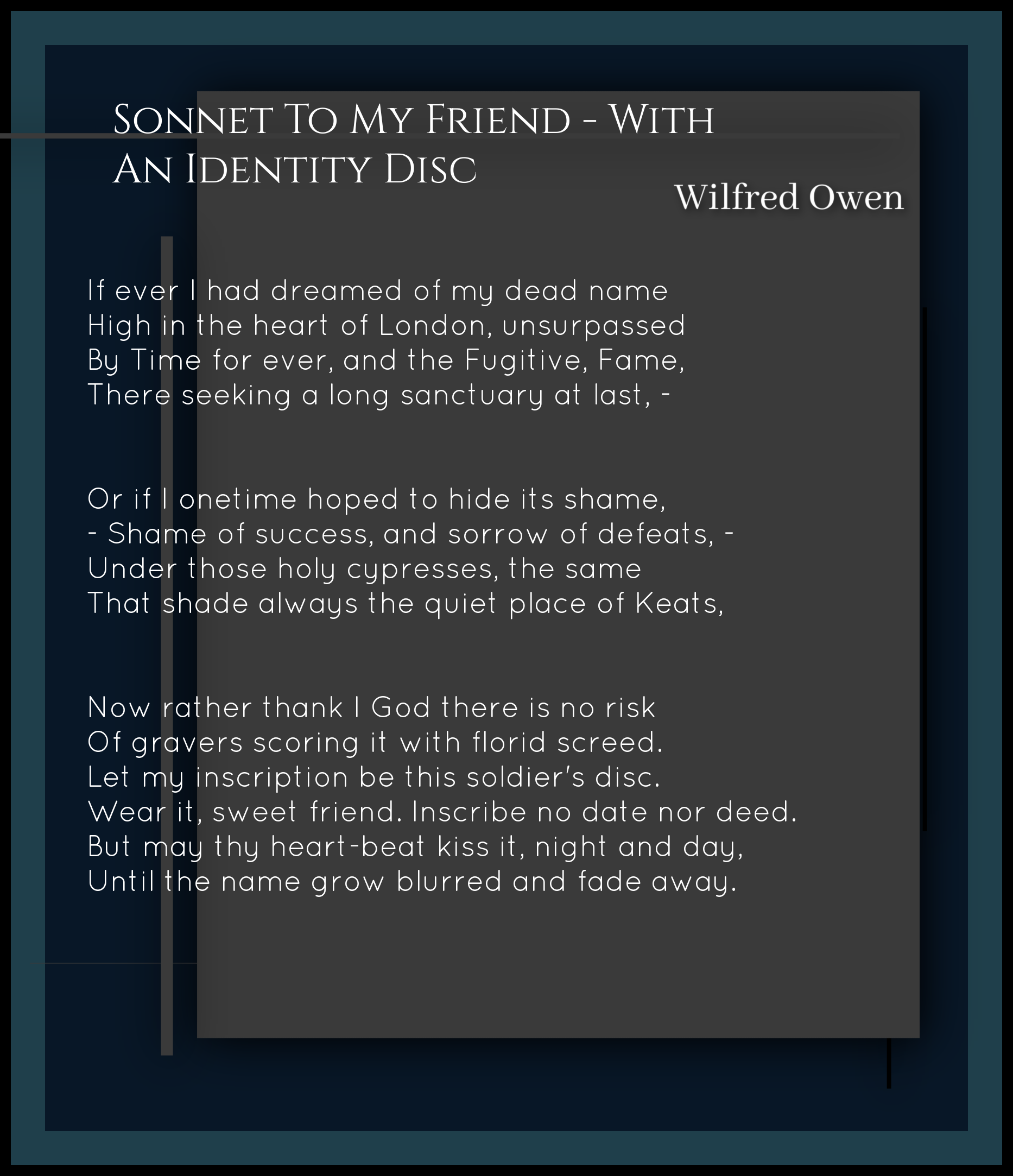Strange Meeting
It seemed that out of the battle I escaped
Down some profound dull tunnel, long since scooped
Through granites which Titanic wars had groined.
Yet also there encumbered sleepers groaned,
Too fast in thought or death to be bestirred.
Then, as I probed them, one sprang up, and stared
With piteous recognition in fixed eyes,
Lifting distressful hands as if to bless.
And by his smile, I knew that sullen hall;
And by his dead smile I knew we stood in Hell.
With a thousand fears that vision's face was grained;
Yet no blood reached there from the upper ground,
And no guns thumped, or down the fluies made moan.
"Strange, friend," I said, "Here is no cause to mourn."
"None," said the other, "Save the undone years,
The hopelessness. Whatever hope is yours,
Was my life also; I went hunting wild
After the wildest beauty in the world,
Which lies not calm in eyes, or braided hair,
But mocks the steady running of the hour,
And if it grieves, grieves richlier than here.
For by my glee might many men have laughed,
And of my weeping something has been left,
Which must die now. I mean the truth untold,
The pity of war, the pity war distilled.
Now men will go content with what we spoiled.
Or, discontent, boil bloody, and be spilled.
They will be swift with swiftness of the tigress,
None will break ranks, though nations trek from progress.
Courage was mine, and I had mystery;
Wisdom was mine, and I had mastery;
To miss the march of this retreating world
Into vain citadels that are not walled.
Then, when much blood had clogged their chariot-wheels
I would go up and wash them from sweet wells,
Even with truths that lie too deep for taint.
I would have poured my spirit without stint
But not through wounds; not on the cess of war.
Foreheads of men have bled where no wounds were.
I am the enemy you killed, my friend.
I knew you in this dark; for so you frowned
Yesterday through me as you jabbed and killed.
I parried; but my hands were loath and cold.
Let us sleep now…
Disabled
And shivered in his ghastly suit of grey,
Legless, sewn short at elbow. Through the park
Voices of boys rang saddening like a hymn,
Voices of play and pleasure after day,
Till gathering sleep had mothered them from him.
About this time Town used to swing so gay
When glow-lamps budded in the light blue trees,
And girls glanced lovelier as the air grew dim,-
In the old times, before he threw away his knees.
Now he will never feel again how slim
Girls' waists are, or how warm their subtle hands.
All of them touch him like some queer disease.
There was an artist silly for his face,
For it was younger than his youth, last year.
Now, he is old; his back will never brace;
He's lost his colour very far from here,
Poured it down shell-holes till the veins ran dry,
And half his lifetime lapsed in the hot race
And leap of purple spurted from his thigh.
One time he liked a blood-smear down his leg,
After the matches, carried shoulder-high.
It was after football, when he'd drunk a peg,
He thought he'd better join. - He wonders why.
Someone had said he'd look a god in kilts,
That's why; and maybe, too, to please his Meg,
Aye, that was it, to please the giddy jilts
He asked to join. He didn't have to beg;
Smiling they wrote his lie: aged nineteen years.
Germans he scarcely thought of; all their guilt,
And Austria's, did not move him. And no fears
Of Fear came yet. He thought of jewelled hilts
For daggers in plaid socks; of smart salutes;
And care of arms; and leave; and pay arrears;
Esprit de corps; and hints for young recruits.
And soon, he was drafted out with drums and cheers.
Some cheered him home, but not as crowds cheer Goal.
Only a solemn man who brought him fruits
Thanked him; and then enquired about his soul.
Now, he will spend a few sick years in institutes,
And do what things the rules consider wise,
And take whatever pity they may dole.
Tonight he noticed how the women's eyes
Passed from him to the strong men that were whole.
How cold and late it is! Why don't they come
And put him into bed? Why don't they come?
Exposure
Our brains ache, in the merciless iced east winds that knife us…
Wearied we keep awake because the night is silent…
Low drooping flares confuse our memory of the salient…
Worried by silence, sentries whisper, curious, nervous,
But nothing happens.
Watching, we hear the mad gusts tugging on the wire.
Like twitching agonies of men among its brambles.
Northward incessantly, the flickering gunnery rumbles,
Far off, like a dull rumour of some other war.
What are we doing here?
The poignant misery of dawn begins to grow…
We only know war lasts, rain soaks, and clouds sag stormy.
Dawn massing in the east her melancholy army
Attacks once more in ranks on shivering ranks of gray,
But nothing happens.
Sudden successive flights of bullets streak the silence.
Less deadly than the air that shudders black with snow,
With sidelong flowing flakes that flock, pause and renew,
We watch them wandering up and down the wind's nonchalance,
But nothing happens.
Pale flakes with lingering stealth come feeling for our faces—
We cringe in holes, back on forgotten dreams, and stare, snow-dazed,
Deep into grassier ditches. So we drowse, sun-dozed,
Littered with blossoms trickling where the blackbird fusses.
Is it that we are dying?
Slowly our ghosts drag home: glimpsing the sunk fires glozed
With crusted dark-red jewels; crickets jingle there;
For hours the innocent mice rejoice: the house is theirs;
Shutters and doors all closed: on us the doors are closed—
We turn back to our dying.
Since we believe not otherwise can kind fires burn;
Now ever suns smile true on child, or field, or fruit.
For God's invincible spring our love is made afraid;
Therefore, not loath, we lie out here; therefore were born,
For love of God seems dying.
To-night, His frost will fasten on this mud and us,
Shrivelling many hands and puckering foreheads crisp.
The burying-party, picks and shovels in their shaking grasp,
Pause over half-known faces. All their eyes are ice,
But nothing happens.
The Sentry
We'd found an old Boche dug-out, and he knew,
And gave us hell, for shell on frantic shell
Hammered on top, but never quite burst through.
Rain, guttering down in waterfalls of slime,
Kept slush waist-high and rising hour by hour,
And choked the steps too thick with clay to climb.
What murk of air remained stank old, and sour
With fumes of whizz-bangs, and the smell of men
Who'd lived there years, and left their curse in the den,
If not their corpses…
There we herded from the blast
Of whizz-bangs, but one found our door at last,
Buffeting eyes and breath, snuffing the candles,
And thud! flump! thud! down the steep steps came thumping
And sploshing in the flood, deluging muck -
The sentry's body; then his rifle, handles
Of old Boche bombs, and mud in ruck on ruck.
We dredged him up, for killed, until he whined
'O sir, my eyes - I'm blind, - I'm blind, I'm blind!'
Coaxing, I held a flame against his lids
And said if he could see the least blurred light
He was not blind; in time he'd get all right.
'I can't' he sobbed. Eyeballs, huge-bulged like squids',
Watch my dreams still; but I forgot him there
In posting Next for duty, and sending a scout
To beg a stretcher somewhere, and flound'ring about
To other posts under the shrieking air.
Those other wretches, how they bled and spewed,
And one who would have drowned himself for good, -
I try not to remember these things now.
Let dread hark back for one word only: how
Half-listening to that sentry's moans and jumps,
And the wild chattering of his broken teeth,
Renewed most horribly whenever crumps
Pummelled the roof and slogged the air beneath, -
Through the dense din, I say, we heard him shout
'I see your lights!' But ours had long died out.
Sonnet: On Seeing A Piece Of Our
Heavy Artillery Brought Into Action
Be slowly lifted up, thou long black arm,
Great Gun towering towards Heaven, about to curse;
Sway steep against them, and for years rehearse
Huge imprecations like a blasting charm!
Reach at that Arrogance which needs thy harm,
And beat it down before its sins grow worse.
Spend our resentment, cannon, — yea, disburse
Our gold in shapes of flame, our breaths in storm.
Yet, for men's sakes whom thy vast malison
Must wither innocent of enmity,
Be not withdrawn, dark arm, thy spoilure done,
Safe to the bosom of our prosperity.
But when thy spell be cast complete and whole,
May God curse thee, and cut thee from our soul!
Insensibility
I
Happy are men who yet before they are killed
Can let their veins run cold.
Whom no compassion fleers
Or makes their feet
Sore on the alleys cobbled with their brothers.
The front line withers,
But they are troops who fade, not flowers
For poets' tearful fooling:
Men, gaps for filling
Losses who might have fought
Longer; but no one bothers.
II
And some cease feeling
Even themselves or for themselves.
Dullness best solves
The tease and doubt of shelling,
And Chance's strange arithmetic
Comes simpler than the reckoning of their shilling.
They keep no check on Armies' decimation.
III
Happy are these who lose imagination:
They have enough to carry with ammunition.
Their spirit drags no pack.
Their old wounds save with cold can not more ache.
Having seen all things red,
Their eyes are rid
Of the hurt of the colour of blood for ever.
And terror's first constriction over,
Their hearts remain small drawn.
Their senses in some scorching cautery of battle
Now long since ironed,
Can laugh among the dying, unconcerned.
IV
Happy the soldier home, with not a notion
How somewhere, every dawn, some men attack,
And many sighs are drained.
Happy the lad whose mind was never trained:
His days are worth forgetting more than not.
He sings along the march
Which we march taciturn, because of dusk,
The long, forlorn, relentless trend
From larger day to huger night.
V
We wise, who with a thought besmirch
Blood over all our soul,
How should we see our task
But through his blunt and lashless eyes?
Alive, he is not vital overmuch;
Dying, not mortal overmuch;
Nor sad, nor proud,
Nor curious at all.
He cannot tell
Old men's placidity from his.
VI
But cursed are dullards whom no cannon stuns,
That they should be as stones.
Wretched are they, and mean
With paucity that never was simplicity.
By choice they made themselves immune
To pity and whatever mourns in man
Before the last sea and the hapless stars;
Whatever mourns when many leave these shores;
Whatever shares
The eternal reciprocity of tears.
From My Diary, July 1914
Leaves
Murmuring by miriads in the shimmering trees.
Lives
Wakening with wonder in the Pyrenees.
Birds
Cheerily chirping in the early day.
Bards
Singing of summer, scything thro' the hay.
Bees
Shaking the heavy dews from bloom and frond.
Boys
Bursting the surface of the ebony pond.
Flashes
Of swimmers carving thro' the sparkling cold.
Fleshes
Gleaming with wetness to the morning gold.
A mead
Bordered about with warbling water brooks.
A maid
Laughing the love-laugh with me; proud of looks.
The heat
Throbbing between the upland and the peak.
Her heart
Quivering with passion to my pressed cheek.
Braiding
Of floating flames across the mountain brow.
Brooding
Of stillness; and a sighing of the bough.
Stirs
Of leaflets in the gloom; soft petal-showers;
Stars
Expanding with the starr'd nocturnal flowers.
Hospital Barge At Cerisy
Budging the sluggard ripples of the Somme,
A barge round old Cérisy slowly slewed.
Softly her engines down the current screwed,
And chuckled softly with contented hum,
Till fairy tinklings struck their croonings dumb.
The waters rumpling at the stern subdued;
The lock-gate took her bulging amplitude;
Gently from out the gurgling lock she swum.
One reading by that calm bank shaded eyes
To watch her lessening westward quietly.
Then, as she neared the bend, her funnel screamed.
And that long lamentation made him wise
How unto Avalon, in agony,
Kings passed in the dark barge, which Merlin dreamed.
Happiness
Ever again to breathe pure happiness,
So happy that we gave away our toy?
We smiled at nothings, needing no caress?
Have we not laughed too often since with Joy?
Have we not stolen too strange and sorrowful wrongs
For her hands' pardoning? The sun may cleanse,
And time, and starlight. Life will sing great songs,
And gods will show us pleasures more than men's.
Yet heaven looks smaller than the old doll's-home,
No nestling place is left in bluebell bloom,
And the wide arms of trees have lost their scope.
The former happiness is unreturning:
Boys' griefs are not so grievous as our yearning,
Boys have no sadness sadder than our hope.
The End
After the blast of lightning from the east,
The flourish of loud clouds, the Chariot throne,
After the drums of time have rolled and ceased
And from the bronze west long retreat is blown,
Shall Life renew these bodies? Of a truth
All death will he annul, all tears assuage?
Or fill these void veins full again with youth
And wash with an immortal water age?
When I do ask white Age, he saith not so, —
"My head hangs weighed with snow."
And when I hearken to the Earth she saith
My fiery heart sinks aching. It is death.
Mine ancient scars shall not be glorified
Nor my titanic tears the seas be dried."
A New Heaven
Seeing we never found gay fairyland
(Though still we crouched by bluebells moon by moon)
And missed the tide of Lethe; yet are soon
For that new bridge that leaves old Styx half-spanned;
Nor ever unto Mecca caravanned;
Nor bugled Asgard, skilled in magic rune;
Nor yearned for far Nirvana, the sweet swoon,
And from high Paradise are cursed and banned;
-Let's die home, ferry across the Channel! Thus
Shall we live gods there. Death shall be no sev'rance.
Weary cathedrals light new shrines for us.
To us, rough knees of boys shall ache with rev'rence.
Are not girls' breasts a clear, strong Acropole?
-There our own mothers' tears shall heal us whole.
An Imperial Elegy
Not one corner of a foreign field
But a span as wide as Europe;
An appearance of a titan's grave,
And the length thereof a thousand miles,
It crossed all Europe like a mystic road,
Or as the Spirits' Pathway lieth on the night.
And I heard a voice crying
This is the Path of Glory.
Soldier's Dream
I dreamed kind Jesus fouled the big-gun gears;
And caused a permanent stoppage in all bolts;
And buckled with a smile Mausers and Colts;
And rusted every bayonet with His tears.
And there were no more bombs, of ours or Theirs,
Not even an old flint-lock, not even a pikel.
But God was vexed, and gave all power to Michael;
And when I woke he'd seen to our repairs.
The Young Soldier
It is not death
Without hereafter
To one in dearth
Of life and its laughter,
Nor the sweet murder
Dealt slow and even
Unto the martyr
Smiling at heaven:
It is the smile
Faint as a (waning) myth,
Faint, and exceeding small
On a boy's murdered mouth.
|
